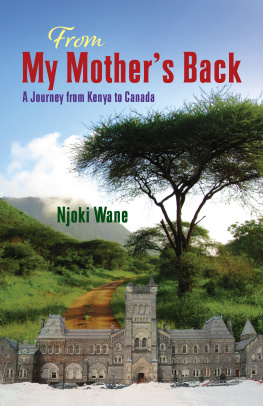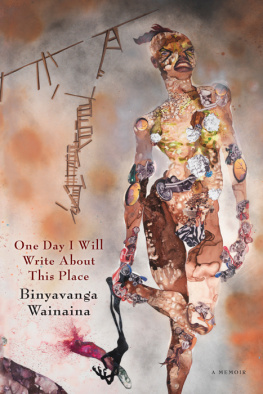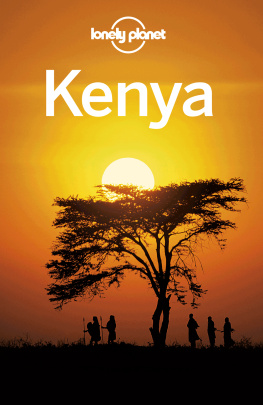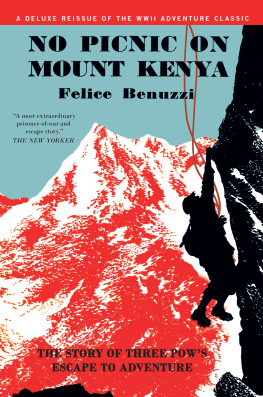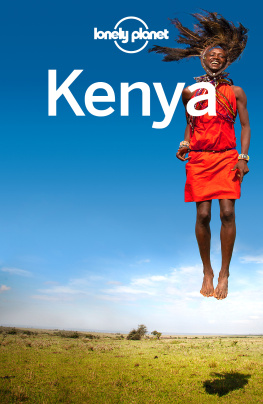May your souls rest in peace.
Foreword
Many African cultures believe that we cannot know a person unless we know their roots and that no one can achieve anything of significance unless they know where they are coming from or where they belong.
I know few people who are as conscious and proud of their roots as Njoki. In her memoir, she clearly shows that shes fully aware of her heritage as she fondly recounts her experiences of growing up in rural Embu. As someone who sees her on a daily basis, I have witnessed how this rootedness manifests in her many actions.
Where many Western-educated Africans (not to say Kenyans) seem to relish their Westernization and distance themselves from their culture, Njoki has deliberately celebrated her Kenyan and Embu beginnings. One does not have to look far for evidence of this. The fact that a young girl known officially as Catherine has chosen to revert to her Kenyan name of Njoki instead of the European name she had to adopt while attending Catholic school speaks volumes.
Some might misinterpret this as a rejection of European culture or norms. However, anyone who knows Njoki will see this more appropriately as evidence that one can practise what the late Senegalese writer and president Lopold Sdar Senghor advocated: rootedness and openness. Njoki shows that one can be at the same time very attached to and respectful of ones culture while also being open and appreciative of what other cultures offer.
In this memoir Njoki shares with the reader stories about her life in Kenya and Canada. With great humour, she tells of growing up in the countryside, going to boarding school and receiving her first pair of high-heeled shoes. She also shares her life in Canada as a graduate student, then as a university professor at the University of Toronto.
There are many qualities to admire in Njoki. It will be obvious to the reader that she is a person who realizes that she has been blessed with a lot of opportunities in life and who feels its important to share with others. Over the years, I have met many of her students who privately have told me of her many acts of kindness that went beyond what they expected of a professor.
Despite all her achievements, Njoki is a humble person who relates equally well to the very highly educated and to the rural folks she celebrates in a lot of her professional writing. I have seen her equally at ease entertaining ministers or socializing with African women farmers.
This ability to navigate between many worlds is part of what makes Njokis memoir very entertaining and educational. Readers, irrespective of their backgrounds, will find some stories that bring a smile to their face or make them think of their own histories. Even though Njoki writes as a Kenyan, her stories will resonate with non-Kenyans and non-Africans as the themes she discusses are universal: family, school, culture. Just as she does in everyday life, Njoki makes space for everyone in her memoirs.
Amadou Wane
Introduction
It feels like just yesterday that I was a little girl hopping my way to the river to fetch water only to rush back home with an almost empty container because half the water had spilled on me. I can still remember trying to balance a small steel sufuria that my mother or my elder sisters had designated as my container for fetching water from the Ena River.
The container felt special because it was small, just like me, and my mother never used it for cooking. It was always left in the kitchen, on the wooden drying platform made of twigs, ready for me to pick it up and run to the river to fetch water. Everyone in the family knew how fast I could run (unless I was instructed otherwise) and because of that I was always the one sent for errands: buying salt or sugar from the village shops, delivering a pint of milk to my grandmothers house, being sent to the bush to look for firewood. I took great pride in my tasks even when the results werent quite what had been expected. The only firewood small enough for me to collect was supposed to be used to make tea for my brothers visitors. They could only laugh when I regularly returned home with a load of twigs that were not nearly dry enough to burn and could not be used for weeks, if not months!
Who cares? I thought. As long as I brought home a load of firewood, even if it could not make anybodys fire, I had fulfilled my purpose. I was imaginative and ambitious, always looking to the future and painting my world with images of wonder yet to come. I was quick to point out to my brothers or sisters that it would only be a matter of time before the world changed. That I would just press a button to prepare a cup of tea for them or turn a knob and water would flow my imagination always carried me away. I always thought of the day when I would never have to go to the river to bring water home or go to the bushes in search of firewood.
Many times I would arrive from the river, soaking wet, and would turn to Mother and say, Mami! When I am done with school, I will make sure you have piped water right there. I pointed to the centre of the compound. No more calabashes or big containers on your head or back.
My mother would laugh and say, You know, Njoki, I believe you. One day you will have water in your own home, not here: far, far from here.
All members of my family knew me as a happy little girl, very playful, full of life and nothing bothered me. I was a joyful child.
Not all my imaginings came to fruition before my mother passed on, but she was able to enjoy cooking with a gas stove and having water piped up to her compound but not inside her house before she died. However, she did not live to enjoy a cup of tea produced by a microwave. Who would have thought that the small girl who used to run to Ena River to fetch water, or go to the bushes to look for firewood, would one day stand in her kitchen far from her kijiji which means village in Kiswahili and be pressing buttons for cooking. That shed press a knob and water would flow, press a button and dishes would be washed.
Probably for many Canadians, my childhood seems far-fetched. It is not for someone who grew up in a small kijiji in rural Kenya. Kijiji for me was that place where everyone knew one another. Where the women assisted each other during childbirth. Where neighbours ploughed and harvested for you when you were not well. Kijiji had a sense of belonging. There was one primary school, one Protestant church, one chief. Later in the book, I talk about our evacuation during the fight for independence. People from the kijiji were forced to leave our homes; however, when independence was declared in 1963, everyone returned.

